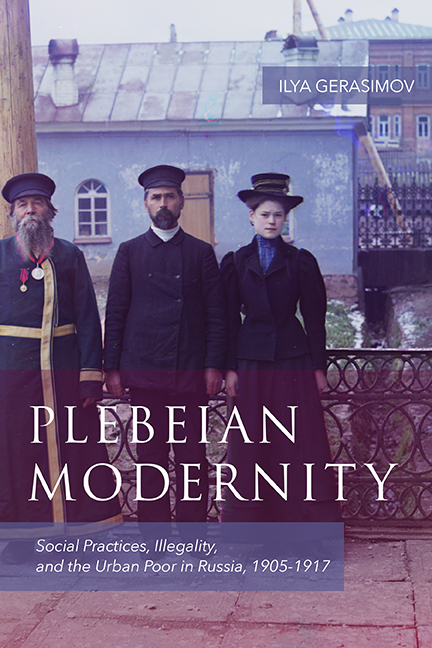Book contents
- Frontmatter
- Contents
- Acknowledgments
- Note on Editorial Conventions
- Introduction: The Subalterns Speak Out: Gerasim and the Infamous
- 1 Writing Degree Zero, and Beyond: Reading Social Practices between the Lines
- 2 The Middle Volga City as the Middle Ground: Urban Plebeian Society
- 3 The Patriarchal Metropolis: Trespassing Social Barriers in Late Imperial Vilna
- 4 “We Only Kill Each Other”: The Anthropology of Deadly Violence and Contested Intergroup Boundaries
- 5 The Transformative Social Experience of Illegality
- Epilogue: Gerasim in Power: A Plebeian Modernity
- Notes
- Selected Bibliography
- Index
Introduction: The Subalterns Speak Out: Gerasim and the Infamous
Published online by Cambridge University Press: 09 June 2021
- Frontmatter
- Contents
- Acknowledgments
- Note on Editorial Conventions
- Introduction: The Subalterns Speak Out: Gerasim and the Infamous
- 1 Writing Degree Zero, and Beyond: Reading Social Practices between the Lines
- 2 The Middle Volga City as the Middle Ground: Urban Plebeian Society
- 3 The Patriarchal Metropolis: Trespassing Social Barriers in Late Imperial Vilna
- 4 “We Only Kill Each Other”: The Anthropology of Deadly Violence and Contested Intergroup Boundaries
- 5 The Transformative Social Experience of Illegality
- Epilogue: Gerasim in Power: A Plebeian Modernity
- Notes
- Selected Bibliography
- Index
Summary
This book tells simple life stories of very ordinary people who found themselves in mundane situations familiar to or at least easily recognizable to everyone. The events took place just over a century ago, during the interrevolutionary period of 1905–17, in the urban landscape still largely present in Russia, Ukraine, and Lithuania. This illusion of closeness—spatial, chronological, and cultural—presents the main challenge in telling those life stories correctly, as stories of other people rather than our perceived knowledge of those people. Back in 1917, Viktor Shklovsky, a founding father of the Russian Formalist tradition of literary criticism, coined the concept of “defamiliarization” (literally, “estrangement”) to describe the effort to differentiate our habits of thought from an object's deeper meaning by alienating it and making the object look strange, unfamiliar, or unpredictable. The same idea was captured in 1953 in the famous dictum by L. P. Hartley, “The past is a foreign country: they do things differently there.” To accurately introduce the protagonists of this study and their exploits—in fact, even to identify them by some generic name as a group—we need to recognize all the foreignness of their world and the strangeness of their perceptions of it.
To illustrate the process of defamiliarization at work on universally recognizable material directly related to this study, let us briefly review the wellknown novella Mumu by the famous Russian realist writer Ivan Turgenev. Written in 1852 and published in 1854, it was included in the school curriculum in Russia for the first time in 1874, and for the past century or so has remained compulsory reading in Russian middle schools. This is the story of the exceptionally tall, strongly built, and hardworking but deaf and nonspeaking serf Gerasim. Taken from his native village, he serves at the city mansion of his landlady. At her whim, Gerasim drowns his only soul mate—the dog Mumu. After demonstrating this excessively resolute obedience, he packs his belongings and leaves for his native village, refusing to serve her any longer.
- Type
- Chapter
- Information
- Plebeian ModernitySocial Practices, Illegality, and the Urban Poor in Russia, 1906–1916, pp. 1 - 17Publisher: Boydell & BrewerPrint publication year: 2018

